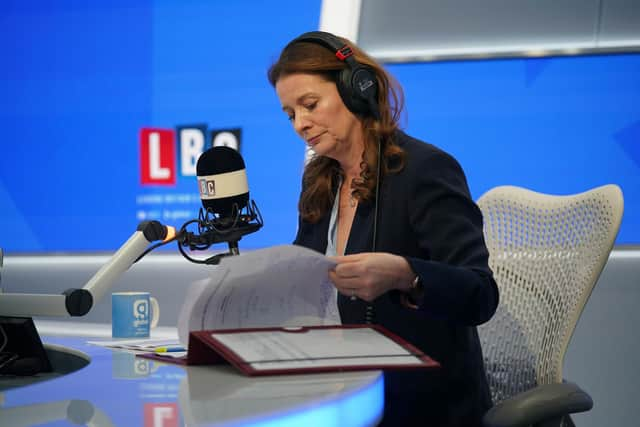The Government’s announcement on mobile phone policy in schools shows it is out of touch - Jayne Dowle
Yet earlier this week, Gillian Keegan proudly announced a crackdown on allowing pupils access to phones in school. Forgive me, but haven’t we heard this many times before?
Parents will no doubt be aware that most schools these days have at least some policies in place to stop kids scrolling when they should be studying, or worse, using their mobiles to bully and intimidate other youngsters in the playground via social media.
Advertisement
Hide AdAdvertisement
Hide AdMs Keegan obviously has memory shorter than a 1980s Motorola. I’m sure I recall her promising such a crackdown in English schools during her party conference speech last autumn. Then not a peep, or even a beep.


Why go for it now then? Could it be because following two colossal by-election defeats last week, in Wellingborough, Northamptonshire and Kingswood, Gloucestershire, and storm clouds gathering for a possible May date for the General Election, the government desperately needs to look as if it’s doing something?
If our children’s education wasn’t such a serious subject, this really would be quite laughable.
It turns out that the mobile phones guidance is not even statutory. Schools are being given a variety of ways to implement the so-called ban, ranging from an order to leave all phones at home, to handing them in on arrival or keeping them in inaccessible lockers, or allowing students to keep them on condition they are not used or heard.
Advertisement
Hide AdAdvertisement
Hide AdThe Department for Education had consulted headteachers and Ms Keegan argues that this new guidance will “empower” those yet to fully ban phones, and “would send a clear message about consistency”.
Not sure about a ‘clear message’. As the mother of two young adults, with my daughter still at sixth form college, this all feels a bit groundhog day. Ministers have been making similar pledges for at least five years. Seizing on the bete noire of mobile phones is an easy way to look busy without having to go to the trouble of spending any money, or engaging meaningfully with teaching unions.
By doing not much, however, Ms Keegan has actually caused trouble. Her announcement not only reminds us just what her government is failing to do for education – from the debacle over the free childcare she still can’t guarantee, to the worsening crisis in university funding – it’s also irked teachers.
Geoff Barton, general secretary of the Association of School and College Leaders, calls the mobiles move “a non-policy for a non-problem”.
Advertisement
Hide AdAdvertisement
Hide Ad“Most schools already forbid the use of mobile phones during the school day or allow their use only in limited and stipulated circumstances,” he told reporters.
“We have lost count of the number of times that ministers have now announced a crackdown on mobile phones in schools.
“The government would be far better off putting its energies into bringing to heel the online platforms via which children are able to access disturbing and extreme content.”
Most parents agree with this, including the mother of murdered trans 16-year-old Brianna Ghey. Her teenage killers were found to have accessed violent and disturbing content before planning their attack. Brianna’s mother is now campaigning for mobile phones to be made specifically for children under 16 with controls to protect them from online harm.
Advertisement
Hide AdAdvertisement
Hide AdThe point is, the proliferation of smartphones in schools - Ofcom data says 97 per cent of children have one by the age of 12 – has run far ahead of the government’s attempts to control them.
Therefore, the vast majority of schools already have strict rules on mobile phone use. A Teacher Tapp poll last month found that more than 80 per cent have either banned phones altogether, do not permit their use during the school day or only allow them when specifically permitted by a teacher. Very few schools – it’s believed to be less than one per cent – allow pupils complete free rein over phones these days.
If this government really wants to make a difference, it should crack down on the tech companies that refuse to put controls on violent or sexually explicit content, allowing children to find it.
Instead of empty threats, equip schools with the funding and resources they need to deal with all forms of bullying, including online.
Comment Guidelines
National World encourages reader discussion on our stories. User feedback, insights and back-and-forth exchanges add a rich layer of context to reporting. Please review our Community Guidelines before commenting.
